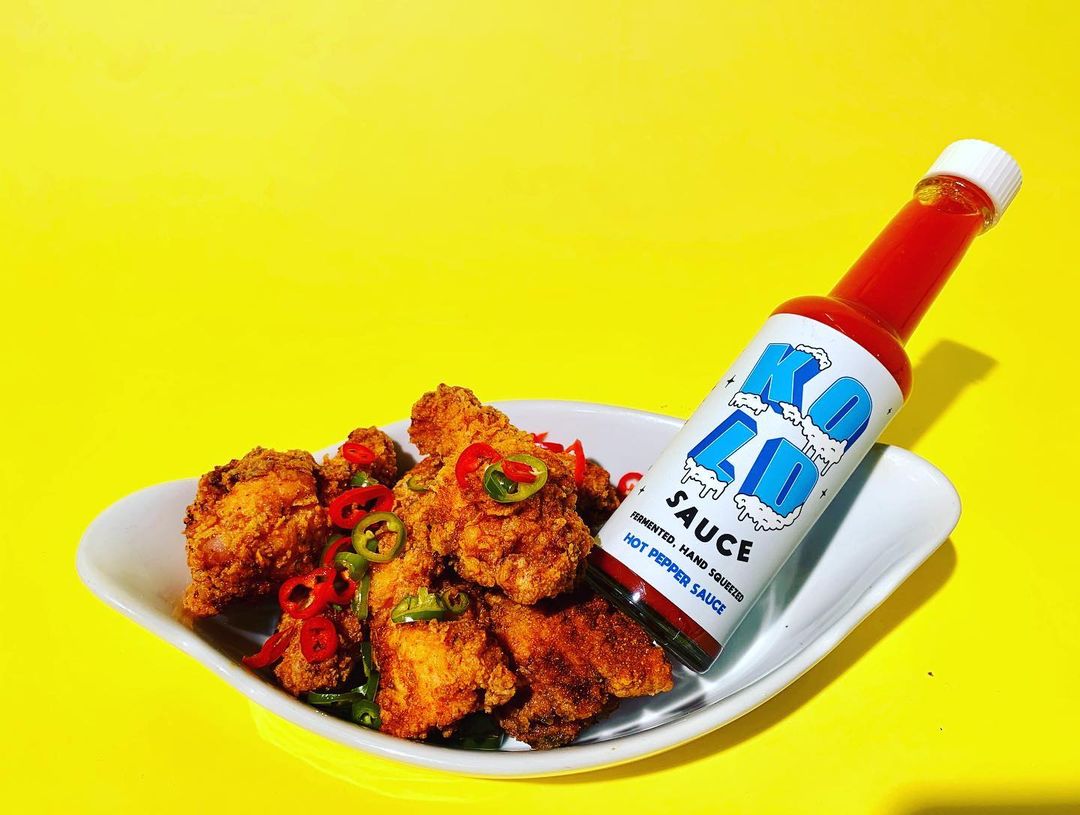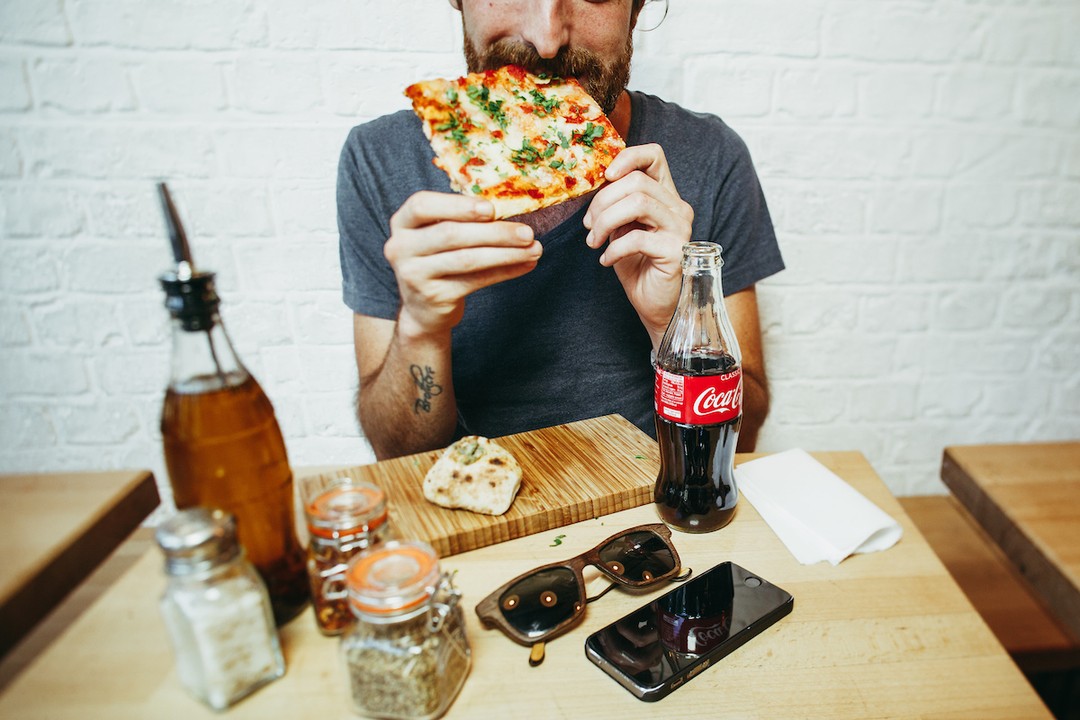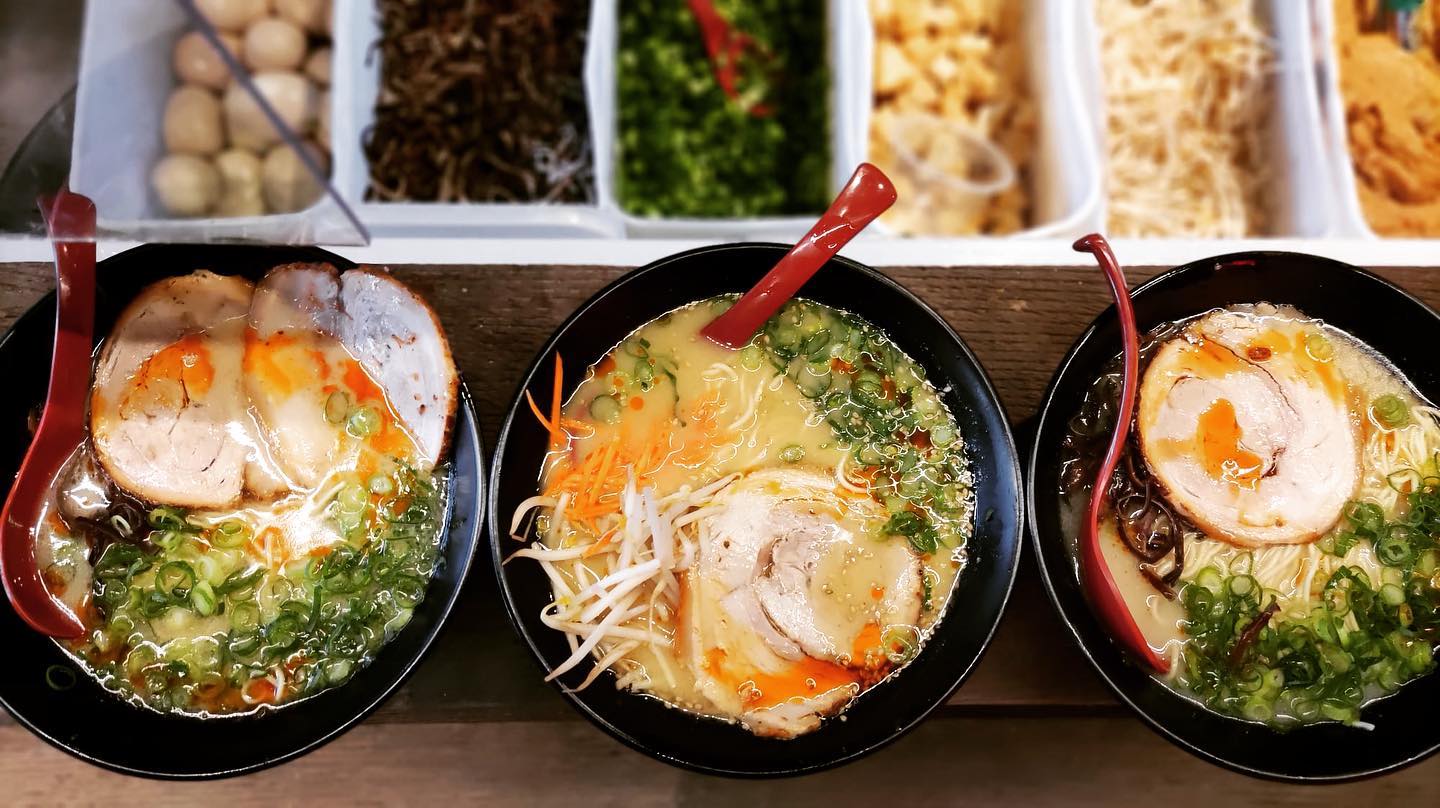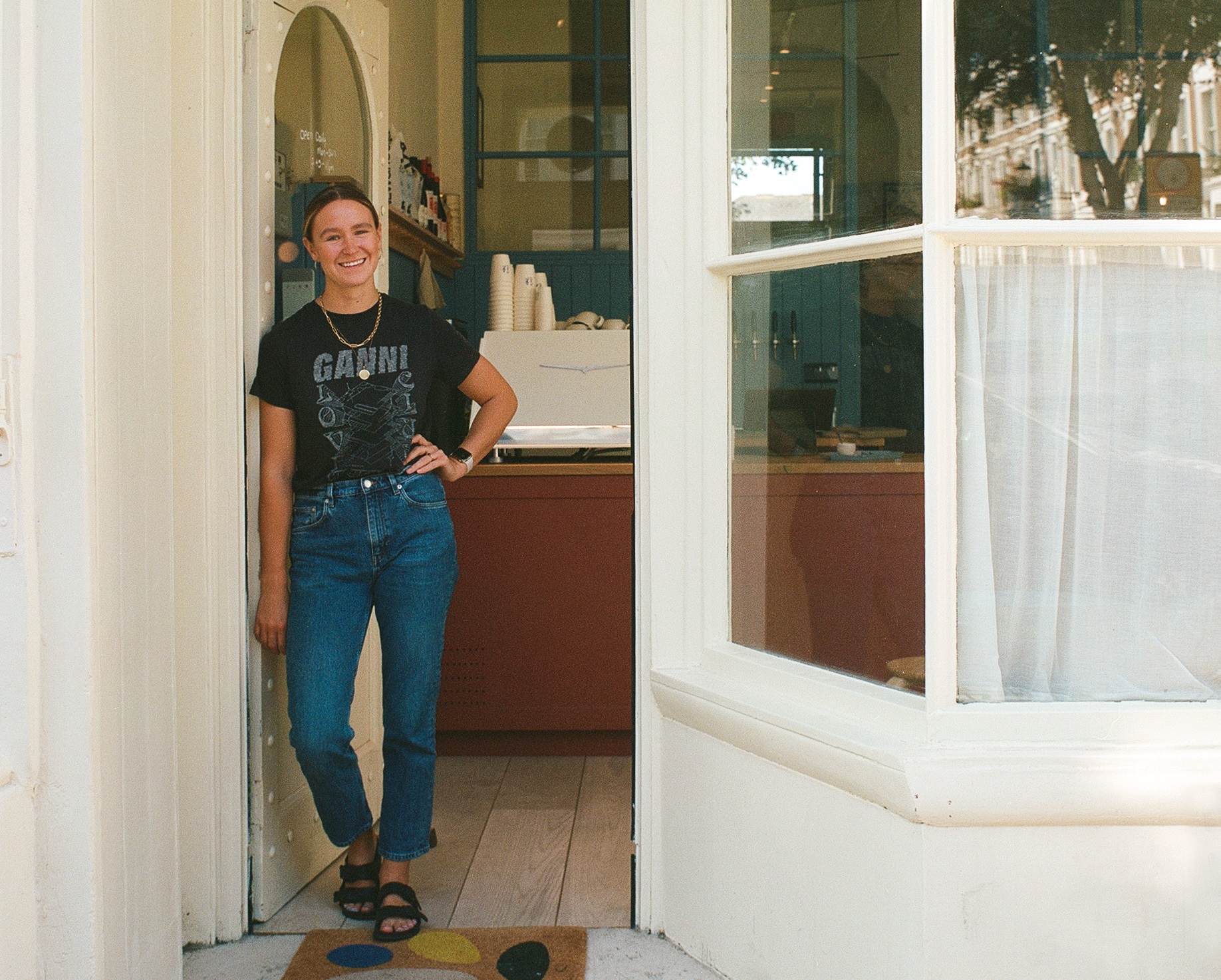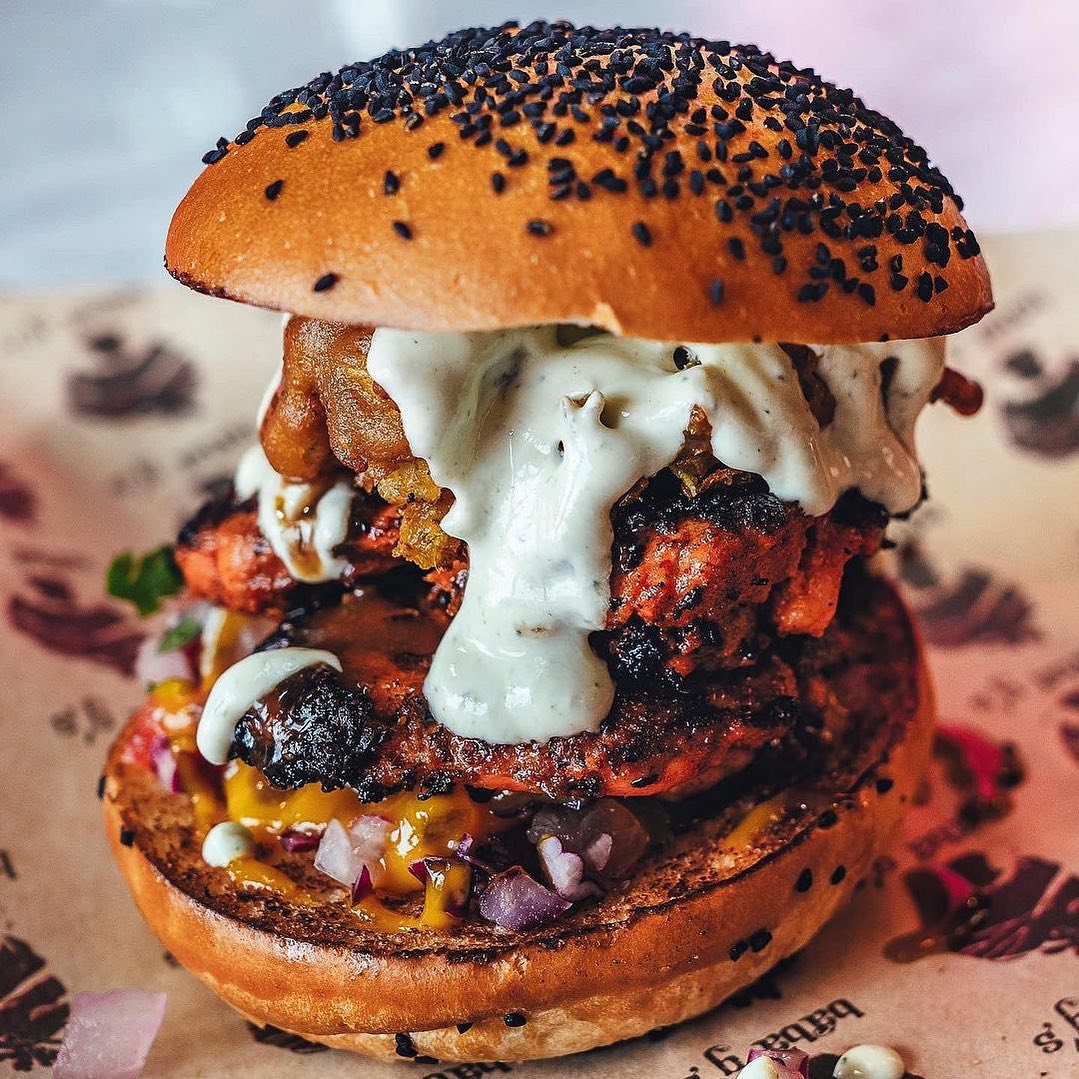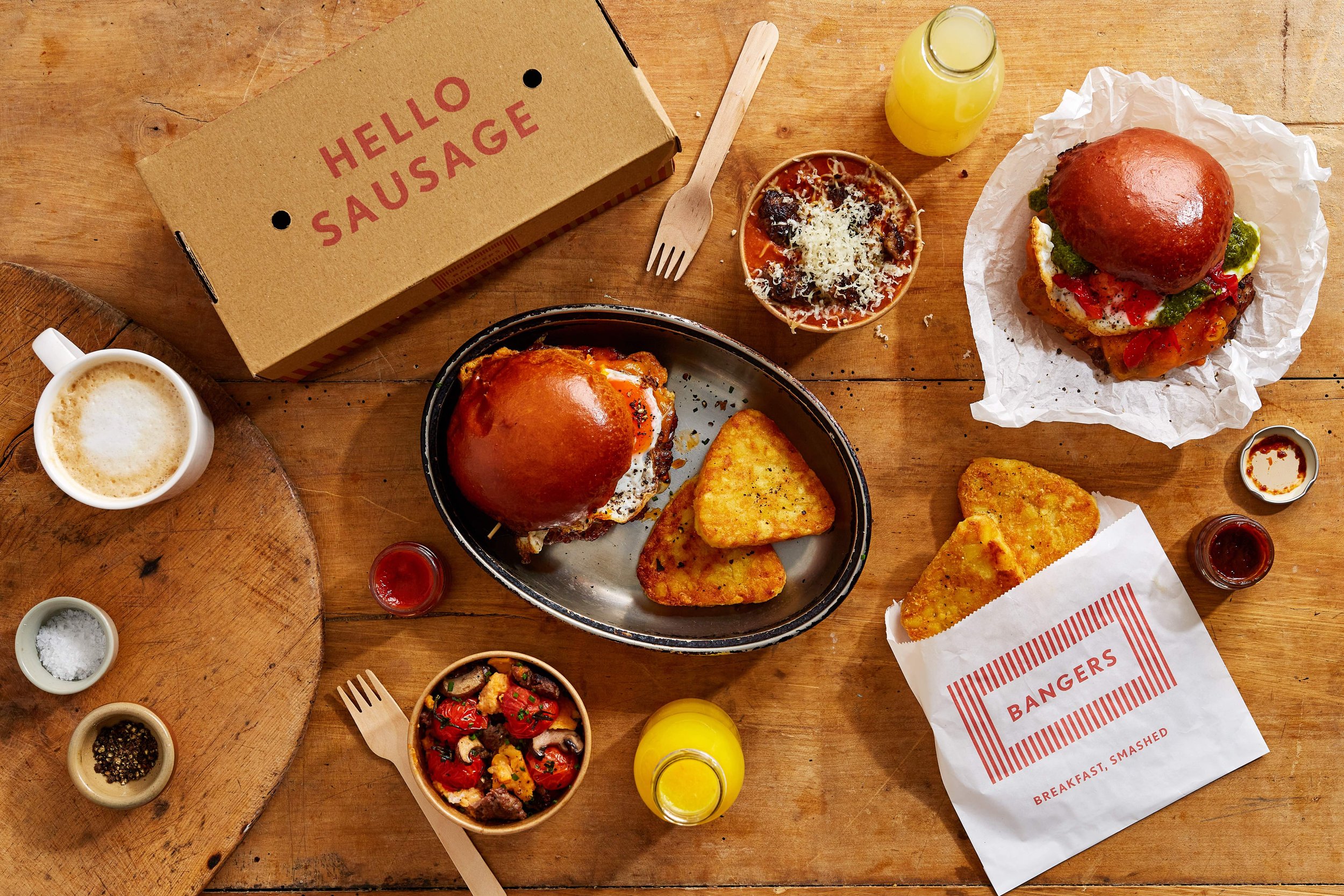We all know that hospitality has experienced quite the shake-up over this past year. However (and thank goodness that there is a “however”), the food world hasn’t just stopped. Chefs and hospitality employees have worked very, very hard at adapting to this brave new world. Beyond those existing food vendors who successfully transformed their business models, we have also seen a number of new food businesses appear, coping but also thriving. One of those businesses is Kold Sauce, an independently made, top quality hot sauce, led by a small team dedicated to using their brand for good. We spoke to Kold Sauce’s co-founder Drew Wolf, whose perspective, experience and natural gift for storytelling produced a genuinely riveting interview with us at Hawkker.


Why don’t you tell us a bit about yourself, and how Kold Sauce got started?
Right! So, I moved to London about twelve years ago, and that was from Brooklyn. I worked in the creative industries in New York and continued to do so in London – I ended up doing a master’s degree here and took a couple of roles within filmmaking and creative advertising, so my background is technically creative – I’ve been a creative director for fifteen years. A lot of the work that I’ve been doing during that time has been about connecting culture to brands and making impactful work. So that was my background – but the landscape has since changed. No-one today actually wants to see an ad. And I don’t feel like making them anymore.
At the time the pandemic first hit, I was doing a lot of freelance work for various agencies; my wife and I had a bit of time to think about what we had most enjoyed doing the past couple of years, what creative projects we found most interesting, where we were getting the most fulfilment. And upon reflection, I realised that the agencies I was working for were falling short on things I found important, as far as their stand on sustainability, equal representation, or actually making a positive impact on culture.
I found the fermentation process really interesting – you have these live things in your home, like weird pets
But there was one project that I worked on a couple of years back that I had loved, that involved looking at different types of fermentation, from kombucha and sauerkraut, to kimchi and fermented hot sauce. I found the fermentation process really interesting – you have these live things in your home, like weird pets – and, paired with my love of hot sauce, I ended up trying to make some fermented hot sauce myself. I got it wrong fifty times, maybe a hundred times.


You look at cookbooks, you look at Reddit, YouTube, Twitter, and all these people’s websites, and you try to pull together all these different methodologies, until you realise that you learn much more from looking and smelling and tasting and touching, and understanding, than you do from anybody else’s recipe – that’s the beauty of it.
So during lockdown, I had that project on the shelf, and thought, you know what, why don’t I stop doing all this work that’s stressing me out, and instead apply everything that I’ve learned to making this sauce. And that’s how Kold Sauce was born. Traditional hot sauce for me is bright red, it doesn’t have any fruit in it, there’s not a chutney or a pickle. Instead, it’s derivative of old Asian, South American, Jamaican, Eastern European sauces. Each of these cultures has a bright red, fermented hot sauce that’s super simple and tastes incredible. And those are the ones that really enhance your food, rather than mask it.
And we called it “Kold” sauce for two reasons: first is that I have a bad sense of humour and I like the idea of calling hot sauce, cold sauce. And second, which is the main reason, is because we don’t pasteurise the sauce. It’s not cooked. So when I was experimenting and trying to find what is now the “Kold Sauce” recipe, temperature ended up becoming one of the key factors – from how warm the room was when you were fermenting it, whether or not you heat it up in the end to alter the pH balance or the bacteria within it, all of the temperature based stuff. That’s when the light came on and I thought, “this isn’t hot sauce, this is actually cold sauce”!


What do you look for in the perfect hot sauce?
I always tell people to keep it simple. Everybody forgets that the flavour of a chilli isn’t just spice – chillies have unique and interesting flavours. So the goal of a good hot sauce is to extract the flavours of the chillies while balancing the heat. And once you do that, there’s no room for “pineapples smoked for six months” or all that extra stuff. A lot of time when I look at the ingredients of some hot sauces, if the list is filled with chemicals and thickeners and all of that, I disregard it immediately. Chilli takes centre stage.
The goal of a good hot sauce is to extract the flavours of the chillies while balancing the heat.
And it’s not just me! I know a lot of chefs, and their favourite hot sauces are never the fruity, chutney kind – they’re always bright red, banging, sometimes vinegar based, simple hot sauces. And that’s because they’re the ones that complement the food.
Same thing applies when you look into the history of spicy foods, and the way in which spice is used. It’s always intended to enhance the flavours on your plate, not hide them. So yes, for me the most important thing in making a hot sauce is to strip it down to really basic ingredients, you get that absolutely right and delicious, and THEN you can have a play with smoked things, or fruit, or salt, or sugar, or whatever you want to do. But unless you have that foundation right, don’t start messing around with other stuff.
What was it like starting this business during a pandemic?
Well, I’ll tell you what – there are so many stumbling blocks to starting something new. And that’s even beyond your recipe, beyond your branding; you have to understand the logistics around shipping, you have to understand how to get hygiene codes. And learning all these things has been so exciting both for myself and for my wife, who also works on the business. Almost 80% of our sales are direct-to-consumer sales (D2C), which means that we are meeting amazing people every day, we’re finding new ways to reach customers, and we’re developing our model every day. It’s been a learning curve, but that’s been really exciting for us.


I’ll tell you, around Christmas, which was definitely our busiest time of year, there was a point when a couple of our rooms had stacked cardboard boxes way up to the ceiling, our kitchen space was all barrels of fermenting chilli mash, and I was just blending up some pepper concoction at about 3am. That’s when I thought to myself, “I’ve actually lost my mind. I’ve completely screwed my mind up here, this is insane.” But we’re pretty proud of what we accomplished last year – we sold thousands of bottles of hot sauce with a new brand, and the response has been really great.
That’s so great to hear. I actually got the Green Pepper Kold Sauce at Christmas, and that’s been a total hit.
Oh right, nice! Very glad you liked it.
How have you found the indie food business community in London?
It’s amazing. I mean, I may have lost my mind but my happy place right now is the market at five in the morning. Nobody likes me there, they don’t talk to me, they try to hit me with their forklifts; it’s kind of an ongoing joke – “here comes the pepper guy”. And it’s funny because it’s like a microcosm of the entire city, you have these Turkish guys with Turkish peppers, you have these African guys who are selling these amazing hot peppers I’ve never even seen before, and you’ve got all these different factions of people. It’s brutal in there. And here I come, everybody else has been in there since midnight and I’m there like, “do you mind if I smell one of your scotch bonnets?” and they all have a laugh at me.
I’m there like, “do you mind if I smell one of your scotch bonnets?” and they all have a laugh at me.


But for me it’s really, really interesting to see trucks full of fresh produce coming in from all over the world. You start to see how the infrastructure of food works. You start to learn things you never thought you’d care about. You learn about how Holland has all of these green houses and have a particular season during which they can distribute specific amounts of chilli peppers. And when they’re off-season, the Spanish come on the scene, and when the Spanish are off, you look towards the African ones – so you start to learn the ebbs and flows of chilli pepper imports into the country.
I don’t know if you saw that film, My Octopus Teacher? Well, it really shows how when you focus on one specific subject matter, it becomes an infinite black hole of information. And that’s where I am in the chilli pepper world right now, and I’m really enjoying that. We’ve met so many people who have small, independent food businesses, that we love, that have helped and inspired us, that I can go to when I have a question.
And how important have you found social media to be for growing your business?
It’s absolutely key. It’s how we work – our business thrives on Instagram. I was saying before our aim is always to be primarily D2C, and we cultivate that through developing a community and speaking to customers directly. So, although it’s fantastic to work with some of our retail partners – and frankly we couldn’t have gotten where we are now without them, and we will continue working with them – the crux of our business is a social media business.
When we launched Kold Sauce, it was during a period when we were completely unsure of whether it was going to be a tangible business, but we knew that at the very least we could try and make enough money to donate something to The Trussel Trust. And that was during the initial stages of the pandemic, and the Trussel Trust was a food bank that was really struggling. So we did manage to sell the first handful of batches of Kold Sauce, and all of the profits went to the Trussel Trust. And that was something that we were only able to do thanks to social media.
The other thing we did – I’m originally from Cleveland, Ohio, and that’s where Tamir Rice was shot and killed. So it was important to me to try and contribute to Black Lives Matter causes; we ended up selling the entire batch of “Kold Gold” and donating those profits to the Tamir Rice Foundation.



Yes, it’s a fermented hot sauce, but it’s also a way for us to build a platform that brings positivity into the social space and into the real world.
We are purpose-driven. We try to be more sustainable where we can (we have a fully recyclable bottle), we try to donate as much as we can, we’re sponsoring a football team called Hackney Juniors FC – the entire concept for us is yes, it’s a fermented hot sauce, but it is also a way for us to build a platform that brings positivity into the social space and into the real world. And why not – what else are we going to do, right?
What has been one of your favourite memories that you associate with hot sauce and spice?
Yes! Well, I’ll tell you where it all began. So, this wasn’t day one of hot sauce for me, but when I was in Mexico in Cuernavaca – which basically translates to “land of eternal spring” (Marlon Brando had a house there, it was amazing) – I’m about eighteen years old, studying Art History in Spanish. I had a room in this older lady’s house, and I didn’t have much money at the time so she would make me a sandwich for my lunches. Two pieces of white bread, some sort of processed meat (to this day I have no idea what it was), and a chilli pepper, just right in there!
And the first day I had one, I remember thinking, “this is madness. Who could ever eat something like this? There’s no mayonnaise, there’s no mustard, no ketchup!” Just that one chilli pepper. And so, day five, I’m still eating these sandwiches and I’m hooked on these things. That was the real beginning of spice for me and it has just snowballed from there. I still dream of those disgusting little sandwiches with that fresh chilli pepper in them – fantastic.
That was my first introduction to a proper smack-in-the-face spice. Growing up there was always “Frank’s Red Hot Sauce” and Tabasco, but there wasn’t fresh chilli sauce. And when I was a little bit older, I was in New York at college and I’d be working in kitchens, the cooks you’d be working with would make their own hot sauce. And it would usually be in a little bottle that was unlabelled or just said “kitchen hot sauce”, and you would just learn from these guys. They’d ferment it in buckets, even though they would never call it fermenting, they just knew it as a tradition they’d had passed on.
I still dream of those disgusting little sandwiches with that fresh chilli pepper in them – fantastic.
So, when I started Kold Sauce, I thought about how much I loved that spirit – before hot sauce was cool, it was that. So that’s where I wanted to take it back to: these bright red, really clear and focused hot sauces from my earlier memories of it.


What are your favourite ways to use Kold Sauce?
Yikes! I do splash it on everything. You know, I quite like mixing it with Greek yogurt or mayonnaise as a really nice dip for chicken or whatever, but on eggs is a quality one. In a Bloody Mary too – you won’t get a better one than one with a bit of Kold Sauce!
Kold Gold I think is my favourite to date, it’s super spicy, but… You know what, you’re the first to know I’m bringing back Kold Gold in the spring and summer. Yeah. I worked out a deal with the guy who is going to give me a crate of these yellow scotch bonnets from Jamaica. And I’ll be mixing that with Alfonso mangoes… I’m breaking my own rule, I know.
Kold Gold is the one. We called it Kold Gold because it had that bit of mango in it – I extracted all the pulp from the sauce, dehydrated all the sauce into a powder, and then sprinkled the powder on vanilla ice cream. It was banging. It was weird, but it was amazing.


Why don’t you tell us a bit about yourself, and how Kold Sauce got started?
Right! So, I moved to London about twelve years ago, and that was from Brooklyn. I worked in the creative industries in New York and continued to do so in London – I ended up doing a master’s degree here and took a couple of roles within filmmaking and creative advertising, so my background is technically creative – I’ve been a creative director for fifteen years. A lot of the work that I’ve been doing during that time has been about connecting culture to brands and making impactful work. So that was my background – but the landscape has since changed. No-one today actually wants to see an ad. And I don’t feel like making them anymore.
At the time the pandemic first hit, I was doing a lot of freelance work for various agencies; my wife and I had a bit of time to think about what we had most enjoyed doing the past couple of years, what creative projects we found most interesting, where we were getting the most fulfilment. And upon reflection, I realised that the agencies I was working for were falling short on things I found important, as far as their stand on sustainability, equal representation, or actually making a positive impact on culture.
I found the fermentation process really interesting – you have these live things in your home, like weird pets
But there was one project that I worked on a couple of years back that I had loved, that involved looking at different types of fermentation, from kombucha and sauerkraut, to kimchi and fermented hot sauce. I found the fermentation process really interesting – you have these live things in your home, like weird pets – and, paired with my love of hot sauce, I ended up trying to make some fermented hot sauce myself. I got it wrong fifty times, maybe a hundred times.


You look at cookbooks, you look at Reddit, YouTube, Twitter, and all these people’s websites, and you try to pull together all these different methodologies, until you realise that you learn much more from looking and smelling and tasting and touching, and understanding, than you do from anybody else’s recipe – that’s the beauty of it.
So during lockdown, I had that project on the shelf, and thought, you know what, why don’t I stop doing all this work that’s stressing me out, and instead apply everything that I’ve learned to making this sauce. And that’s how Kold Sauce was born. Traditional hot sauce for me is bright red, it doesn’t have any fruit in it, there’s not a chutney or a pickle. Instead, it’s derivative of old Asian, South American, Jamaican, Eastern European sauces. Each of these cultures has a bright red, fermented hot sauce that’s super simple and tastes incredible. And those are the ones that really enhance your food, rather than mask it.
And we called it “Kold” sauce for two reasons: first is that I have a bad sense of humour and I like the idea of calling hot sauce, cold sauce. And second, which is the main reason, is because we don’t pasteurise the sauce. It’s not cooked. So when I was experimenting and trying to find what is now the “Kold Sauce” recipe, temperature ended up becoming one of the key factors – from how warm the room was when you were fermenting it, whether or not you heat it up in the end to alter the pH balance or the bacteria within it, all of the temperature based stuff. That’s when the light came on and I thought, “this isn’t hot sauce, this is actually cold sauce”!


What do you look for in the perfect hot sauce?
I always tell people to keep it simple. Everybody forgets that the flavour of a chilli isn’t just spice – chillies have unique and interesting flavours. So the goal of a good hot sauce is to extract the flavours of the chillies while balancing the heat. And once you do that, there’s no room for “pineapples smoked for six months” or all that extra stuff. A lot of time when I look at the ingredients of some hot sauces, if the list is filled with chemicals and thickeners and all of that, I disregard it immediately. Chilli takes centre stage.
The goal of a good hot sauce is to extract the flavours of the chillies while balancing the heat.
And it’s not just me! I know a lot of chefs, and their favourite hot sauces are never the fruity, chutney kind – they’re always bright red, banging, sometimes vinegar based, simple hot sauces. And that’s because they’re the ones that complement the food.
Same thing applies when you look into the history of spicy foods, and the way in which spice is used. It’s always intended to enhance the flavours on your plate, not hide them. So yes, for me the most important thing in making a hot sauce is to strip it down to really basic ingredients, you get that absolutely right and delicious, and THEN you can have a play with smoked things, or fruit, or salt, or sugar, or whatever you want to do. But unless you have that foundation right, don’t start messing around with other stuff.
What was it like starting this business during a pandemic?
Well, I’ll tell you what – there are so many stumbling blocks to starting something new. And that’s even beyond your recipe, beyond your branding; you have to understand the logistics around shipping, you have to understand how to get hygiene codes. And learning all these things has been so exciting both for myself and for my wife, who also works on the business. Almost 80% of our sales are direct-to-consumer sales (D2C), which means that we are meeting amazing people every day, we’re finding new ways to reach customers, and we’re developing our model every day. It’s been a learning curve, but that’s been really exciting for us.


I’ll tell you, around Christmas, which was definitely our busiest time of year, there was a point when a couple of our rooms had stacked cardboard boxes way up to the ceiling, our kitchen space was all barrels of fermenting chilli mash, and I was just blending up some pepper concoction at about 3am. That’s when I thought to myself, “I’ve actually lost my mind. I’ve completely screwed my mind up here, this is insane.” But we’re pretty proud of what we accomplished last year – we sold thousands of bottles of hot sauce with a new brand, and the response has been really great.
That’s so great to hear. I actually got the Green Pepper Kold Sauce at Christmas, and that’s been a total hit.
Oh right, nice! Very glad you liked it.
How have you found the indie food business community in London?
It’s amazing. I mean, I may have lost my mind but my happy place right now is the market at five in the morning. Nobody likes me there, they don’t talk to me, they try to hit me with their forklifts; it’s kind of an ongoing joke – “here comes the pepper guy”. And it’s funny because it’s like a microcosm of the entire city, you have these Turkish guys with Turkish peppers, you have these African guys who are selling these amazing hot peppers I’ve never even seen before, and you’ve got all these different factions of people. It’s brutal in there. And here I come, everybody else has been in there since midnight and I’m there like, “do you mind if I smell one of your scotch bonnets?” and they all have a laugh at me.
I’m there like, “do you mind if I smell one of your scotch bonnets?” and they all have a laugh at me.


But for me it’s really, really interesting to see trucks full of fresh produce coming in from all over the world. You start to see how the infrastructure of food works. You start to learn things you never thought you’d care about. You learn about how Holland has all of these green houses and have a particular season during which they can distribute specific amounts of chilli peppers. And when they’re off-season, the Spanish come on the scene, and when the Spanish are off, you look towards the African ones – so you start to learn the ebbs and flows of chilli pepper imports into the country.
I don’t know if you saw that film, My Octopus Teacher? Well, it really shows how when you focus on one specific subject matter, it becomes an infinite black hole of information. And that’s where I am in the chilli pepper world right now, and I’m really enjoying that. We’ve met so many people who have small, independent food businesses, that we love, that have helped and inspired us, that I can go to when I have a question.
And how important have you found social media to be for growing your business?
It’s absolutely key. It’s how we work – our business thrives on Instagram. I was saying before our aim is always to be primarily D2C, and we cultivate that through developing a community and speaking to customers directly. So, although it’s fantastic to work with some of our retail partners – and frankly we couldn’t have gotten where we are now without them, and we will continue working with them – the crux of our business is a social media business.
When we launched Kold Sauce, it was during a period when we were completely unsure of whether it was going to be a tangible business, but we knew that at the very least we could try and make enough money to donate something to The Trussel Trust. And that was during the initial stages of the pandemic, and the Trussel Trust was a food bank that was really struggling. So we did manage to sell the first handful of batches of Kold Sauce, and all of the profits went to the Trussel Trust. And that was something that we were only able to do thanks to social media.
The other thing we did – I’m originally from Cleveland, Ohio, and that’s where Tamir Rice was shot and killed. So it was important to me to try and contribute to Black Lives Matter causes; we ended up selling the entire batch of “Kold Gold” and donating those profits to the Tamir Rice Foundation.



Yes, it’s a fermented hot sauce, but it’s also a way for us to build a platform that brings positivity into the social space and into the real world.
We are purpose-driven. We try to be more sustainable where we can (we have a fully recyclable bottle), we try to donate as much as we can, we’re sponsoring a football team called Hackney Juniors FC – the entire concept for us is yes, it’s a fermented hot sauce, but it is also a way for us to build a platform that brings positivity into the social space and into the real world. And why not – what else are we going to do, right?
What has been one of your favourite memories that you associate with hot sauce and spice?
Yes! Well, I’ll tell you where it all began. So, this wasn’t day one of hot sauce for me, but when I was in Mexico in Cuernavaca – which basically translates to “land of eternal spring” (Marlon Brando had a house there, it was amazing) – I’m about eighteen years old, studying Art History in Spanish. I had a room in this older lady’s house, and I didn’t have much money at the time so she would make me a sandwich for my lunches. Two pieces of white bread, some sort of processed meat (to this day I have no idea what it was), and a chilli pepper, just right in there!
And the first day I had one, I remember thinking, “this is madness. Who could ever eat something like this? There’s no mayonnaise, there’s no mustard, no ketchup!” Just that one chilli pepper. And so, day five, I’m still eating these sandwiches and I’m hooked on these things. That was the real beginning of spice for me and it has just snowballed from there. I still dream of those disgusting little sandwiches with that fresh chilli pepper in them – fantastic.
That was my first introduction to a proper smack-in-the-face spice. Growing up there was always “Frank’s Red Hot Sauce” and Tabasco, but there wasn’t fresh chilli sauce. And when I was a little bit older, I was in New York at college and I’d be working in kitchens, the cooks you’d be working with would make their own hot sauce. And it would usually be in a little bottle that was unlabelled or just said “kitchen hot sauce”, and you would just learn from these guys. They’d ferment it in buckets, even though they would never call it fermenting, they just knew it as a tradition they’d had passed on.
I still dream of those disgusting little sandwiches with that fresh chilli pepper in them – fantastic.
So, when I started Kold Sauce, I thought about how much I loved that spirit – before hot sauce was cool, it was that. So that’s where I wanted to take it back to: these bright red, really clear and focused hot sauces from my earlier memories of it.


What are your favourite ways to use Kold Sauce?
Yikes! I do splash it on everything. You know, I quite like mixing it with Greek yogurt or mayonnaise as a really nice dip for chicken or whatever, but on eggs is a quality one. In a Bloody Mary too – you won’t get a better one than one with a bit of Kold Sauce!
Kold Gold I think is my favourite to date, it’s super spicy, but… You know what, you’re the first to know I’m bringing back Kold Gold in the spring and summer. Yeah. I worked out a deal with the guy who is going to give me a crate of these yellow scotch bonnets from Jamaica. And I’ll be mixing that with Alfonso mangoes… I’m breaking my own rule, I know.
Kold Gold is the one. We called it Kold Gold because it had that bit of mango in it – I extracted all the pulp from the sauce, dehydrated all the sauce into a powder, and then sprinkled the powder on vanilla ice cream. It was banging. It was weird, but it was amazing.
